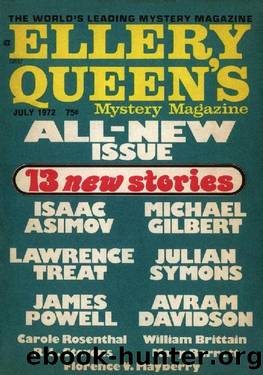EQMM 1972-07 by Ellery Queen’s Mystery Magazine

Author:Ellery Queen’s Mystery Magazine [Magazine, Ellery Queen’s Mystery]
Language: eng
Format: epub
Published: 0101-01-01T00:00:00+00:00
The Jury Box
by John Dickson Carr{© 1972 by John Dickson Carr}
Let there be no iron rule; let the approach vary as seems best.
This month, with your permission, I would pay belated tribute to that English writer who, though a master of mystery, has left behind him (so far as this country is concerned, at least) no work now available in paperback. If I must send you to second-hand bookshops in search of some novel he wrote, almost any novel he wrote, thatâs better than letting you miss them. Probably you wonât mind; being devoted to blood and thunder, you may even relish the search.
Anthony Berkeley Cox, born 1893, died in December of 1970. So far forgot may be auld acquaintance that I did not learn of his passing until fifteen months later. Therefore this appreciation must contain not only tribute but apology.
Tony, as we called him, founded the London Detection Club. Misled by some confusion whose source canât be traced, several sound critics have stated that he founded it in 1928. Though he may have conceived the idea in that year, the club was not actually organized until 1932. This fact appeared in the brochure they once distributed to new members, together with Tonyâs official title of First Freeman.
âNow what,â friends often asked, âdoes First Freeman mean?â Once, to avert a threatened rumpus, Peacemaker John Rhode swore it meant the right to attend all committee meetings and vote at them. Anyway, thatâs what Tony always did; his title had to mean something. But, since other charter members had been R. Austin Freeman and Freeman Wills Crofts, a simpler explanation may be found in his own impassioned avowal.
âWith Freemans to the right, Freemans to the left, Freemans on every side,â he had declared, âthe founder of this club is damn well going to be First Freeman, and donât you forget it!â
Lucky fellow, Tony. Of well-to-do family, with an independent income, he had no need to struggle in the marketplace. Turning to detective stories because he so much enjoyed them, in 1924 he wrote The Layton Court Mystery as Anthony Berkeley.
Then came a distinguished series, his sleuths Roger Sheringham and milquetoast Ambrose Chitterwick: each novel of dazzling ingenuity, each with a twist or double-twist to yank the rug from under us at the end. As the worldâs best practitioner Anthony Berkeley (Great Britain) shared equal honors, as he still shares them, with the editor-in-chief of this magazine (U.S.A.).
As early as â31 he had opened a new door. In Malice Aforethought, calling himself Francis Iles, he studied the mind of a homicidal country doctor. âMurder without mystery,â his publisher rather triumphantly cried. With Before the Fact, which followed, we met a young man of such charm and callousness as to be the death of any person who got in Johnnie Aysgarthâs way.
Among aesthetes, who shudder at detective fiction, it has become the fashion to praise these âpsychologicalâ studies for superior characterization, and to exalt Francis Iles as though Anthony Berkeley had never existed. The true reason they say this lies deeper.
Download
This site does not store any files on its server. We only index and link to content provided by other sites. Please contact the content providers to delete copyright contents if any and email us, we'll remove relevant links or contents immediately.
Batman Begins by Dennis O'Neil(1161)
Fatal Fortune by Miranda Rijks(1078)
The Honjin Murders by Seishi Yokomizo(1061)
The Inugami Curse by Seishi Yokomizo(1050)
Coconut Layer Cake Murder by Joanne Fluke(939)
Thrice the Brinded Cat Hath Mew'd by Alan Bradley(876)
Careless Whiskers by Miranda James(867)
Low Pressure by Sandra Brown(860)
Behind Every Lie by Christina McDonald(752)
Murder at Kensington Palace by Andrea Penrose(691)
Midsummer's Nightmare, A(687)
Candy Slain Murder by Maddie Day(686)
Chocolate Cream Pie Murder (A Hannah Swensen Mystery Book 24) by Joanne Fluke(681)
Beating About the Bush by M. C. Beaton(653)
Murder with Honey Ham Biscuits by A.L. Herbert(640)
Fatal Roots by Sheila Connolly(629)
Thin Ice by Paige Shelton(607)
The Honjin Murders (Pushkin Vertigo) by Seishi Yokomizo(591)
Mystery on Hidden Lane: An utterly gripping cozy mystery novel (An Eve Mallow Mystery Book 1) by Clare Chase(579)
